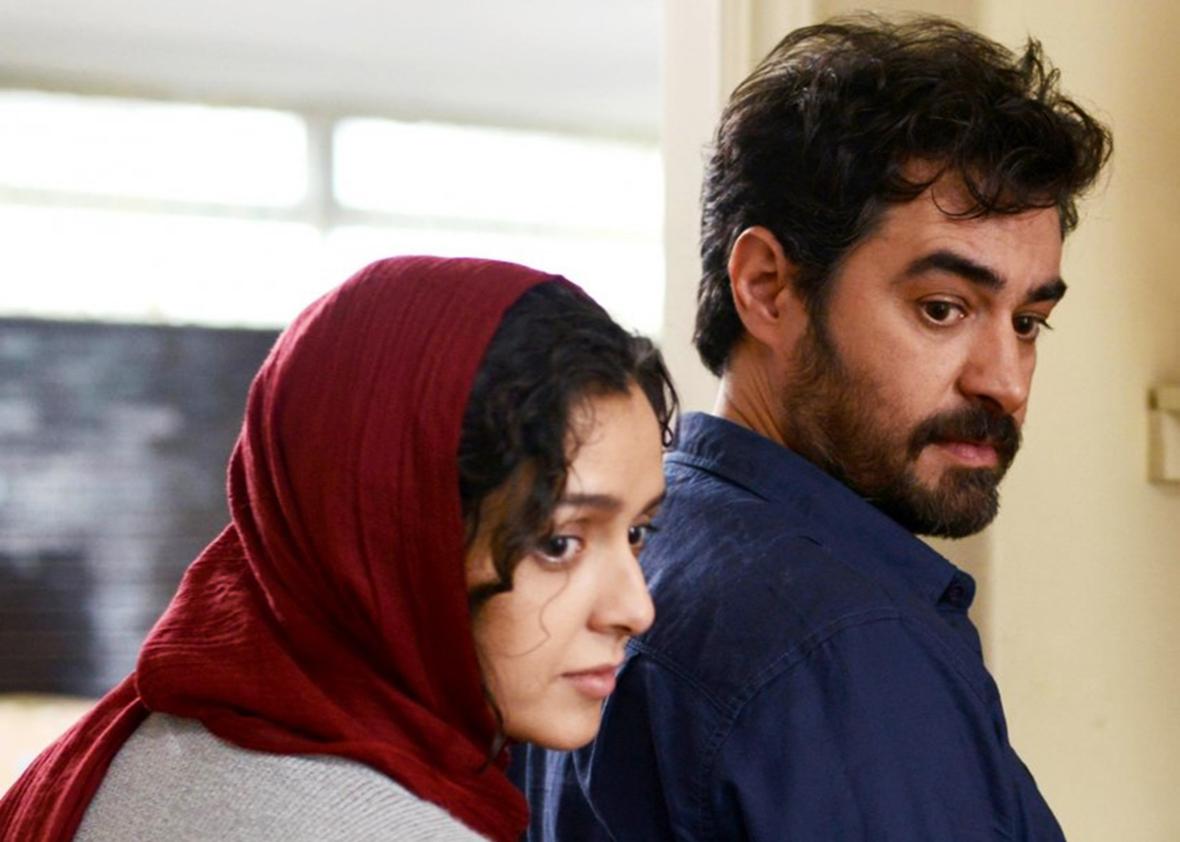The opening titles of The Salesman, Asghar Farhadi’s astute exploration of the aftereffects of a home invasion on the lives of a married couple in Tehran, have an eerily hyperreal quality. Pieces of furniture that seem to belong in a domestic setting appear one by one in isolated shots, bathed in a stark neon glow reminiscent of Edward Hopper’s Nighthawks. We’re in a home of some kind but one that feels empty and artificial. As the first scene of the movie clarifies, these lonely furnishings are in fact pieces of scenery, part of the set for a production of Arthur Miller’s Death of a Salesman that stars the film’s protagonists, Emad Etesami (Shahab Hosseini) and his wife Rana (Taraneh Alidoosti), as Willy and Linda Loman.
Soon afterward the Etesamis’ own home, a modest apartment in a high-rise, is evacuated when a construction project next door reveals dangerous structural weaknesses in their building: Long cracks suddenly open up in the walls as the window glass goes spiderwebby. In need of a place to live while these problems are addressed, the couple rents a flat that until recently housed a single woman who seems to have departed in a hurry, leaving behind a roomful of her belongings. Their new neighbors explain that the previous tenant led a chaotic life with multiple gentleman callers; it’s implied, if never directly stated, that she was a prostitute and a single mother, two black marks against her in a society as sexually conservative as theocratic Iran.
Though the ex-occupant’s unsettled life casts a shadow over their new living space, the Etesamis begin to settle in as the play they’re rehearsing approaches its opening night. Then one night Rana, about to get into the shower, leaves the apartment door open for her husband, who’s just called to say he’s on his way home. Instead, a stranger (unseen by the audience but signaled by a lingering shot of that half-open door) enters the apartment, and by the time Emad arrives his wife is lying unconscious and bloody on the bathroom floor, a trail of blood leading out of the apartment and down the stairs. Coming to, Rana can remember none of the details of the attack: What did the invader look like? What did he do to her? Is her bruised and cut face the result of a violent encounter with this unknown person, or did the unexpected appearance of a stranger in her bathroom simply cause her to slip and fall?
To reveal much more than that would be to rob the viewer of the exquisite moral torture of The Salesman’s second half. As Emad grows increasingly anxious to track down his wife’s mysterious assailant, what at first looks like husbandly chivalry soon begins to seem more like a dangerous fixation on female purity and male revenge. Rana herself, seemingly embarrassed by her own attack, urges him to let it go and move on. But Emad takes it upon himself to start tailing a man he suspects may have some connection to the incident, thereby endangering not only his and his wife’s physical safety but their increasingly troubled marriage.
The filmmaker Asghar Farhadi is best known in the West for his Oscar-winning 2011 film A Separation, which also tracked the dissolution of a marriage, using Iran’s serpentine divorce-court laws as a backdrop. The Salesman, by contrast, barely seems to acknowledge the existence of a legal system. Asked if she wants to report the crime, Rana refuses, fearing that the mere fact of having left the door open will harm her reputation. Farhadi’s critique of institutional sexism is never overt; rather, the power of the all-seeing, all-judging state is made evident by Rana’s complicity in her own erasure.
As the play’s first performance draws near, Emad’s insistence on playing amateur sleuth drives a wedge between the formerly loving couple, making for fraught encounters both onstage and off. All the while—especially after a plausible culprit emerges as the author of the break-in—the audience’s identification keeps shifting; one minute we’re cheering on Emad’s attempts to track down and punish his wife’s assailant, the next we find ourselves sympathizing with Rana’s desperate desire to be left alone to heal in her own time.
The Salesman’s narrative structure, which alternates scenes of the Etesamis’ own domestic struggles with those of the characters they play onstage, sounds fussily formal on paper. But on screen the two storylines interweave seamlessly and subtly, the couple’s real-life problems not so much repeating as refracting the experiences of their fictional counterparts. No space in The Salesman offers the existential stability it at first seems to promise: not those neon-lit stage sets we see in the opening titles, not the high-rise apartment the Etesamis flee as it threatens to crumble around them, not the temporary home they move into next. But the most unstable place of all, as the masterful final pair of shots suggests, is that fragile domestic interior we call marriage, the place where we take for granted that we’re finally home.
